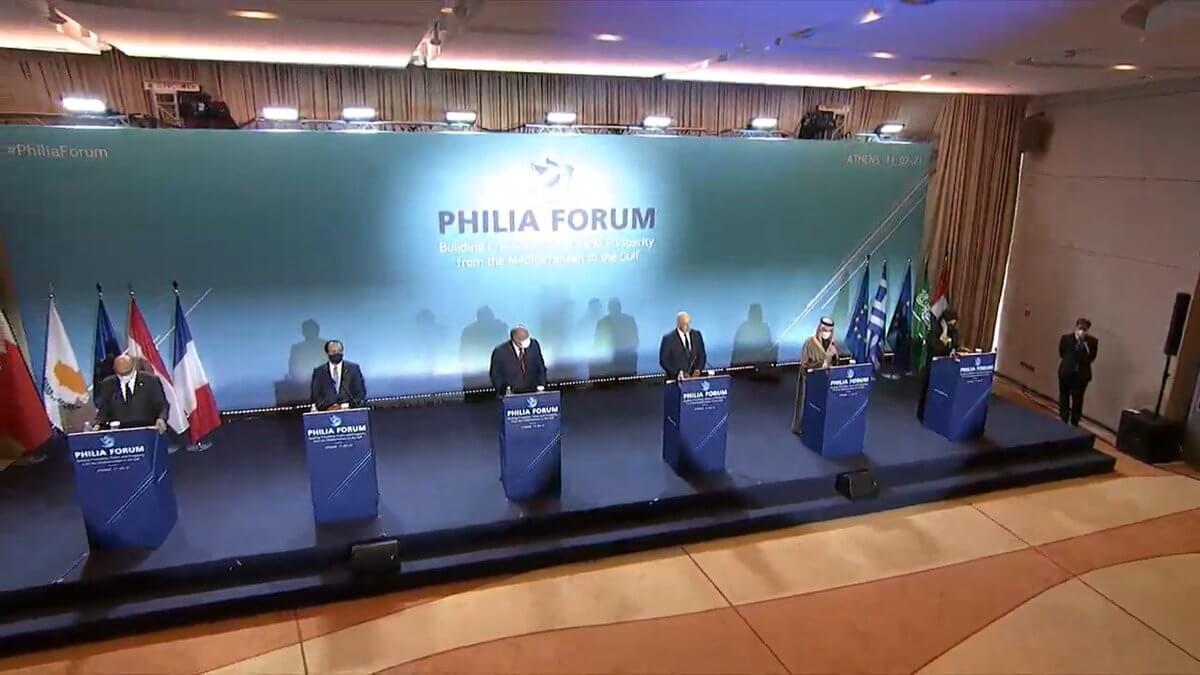On Thursday, Athens hosted the first “Philia Forum” or “Friendship Forum”, which saw the participation of foreign ministers from Greece, France, Egypt, Saudi Arabia, Bahrain, and Cyprus. This meeting was organised as Greece looks to strengthen its alliances with European and Gulf countries amidst growing tensions with Turkey. Through such groupings, Greece has also established itself as a connecting link between the European Union (EU) and the Middle East.
Following their discussion, the Foreign Ministers released a joint statement which highlighted their “strong commitment” to “the respect of sovereign rights, independence and territorial integrity of states, the peaceful resolution of differences and rejection of threat or use of force, the non-interference in other countries’ internal affairs and the freedom of navigation.”
Greek Prime Minister Kyriakos Mitsotakis said that participating counties had agreed to establish a mechanism to have regular meetings. Hinting at Turkish aggression in the East Mediterranean, he added, “It is natural for Greece to seek out this type of cooperation … Multidimensional challenges in our wider neighbourhood make it necessary.”
Meanwhile, leaders from the participating countries, too, reiterated their commitment to working on the resolution of the issue. At a media briefing following the meeting, Saudi Foreign Minister Prince Faisal bin Farhan highlighted the importance of “a united effort to support regional security and stability.” Furthermore, he called for states to respect norms of territorial integrity and abide by international law. During his visit to Athens, the Saudi leader also met with Mitsotakis to discuss the ways to enhance their bilateral relationship, specifically in light of the regional and international issues of common interest.
Similarly, Egyptian Foreign Minister Sameh Hassan Shoukry called for a “peaceful solution to all existing conflicts”. He further added that Egypt was looking to bolster cooperation, enhance its relationship with Greece and Cyprus, and work towards cushioning the political and economic challenges to secure stability for its people. Moreover, on the sidelines of the meeting, Shoukry also met with Cypriot counterpart Nikos Christodoulides to further discuss expanding mutual coordination on regional issues.
Meanwhile, Reem bint Ibrahim Al Hashemy, the United Arab Emirates’ (UAE) Minister of State for International Cooperation, condemned foreign interventions into domestic affairs by states. She also called upon all parties in the East Mediterranean and the Arab regions to adhere to international law and respect the rule of law.
In response, the Turkish Foreign Ministry released a statement condemning the forum. The statement read, “The Greek foreign minister’s accusatory and slanderous remarks at the meeting in Athens indicate this enterprise is not about friendship.” It also said that the forum had taken a “hostile” tone, while Ankara’s focus was on a peaceful solution through genuine cooperation in the East Mediterranean. It added, “Greece and Greek Cyprus’s behaviour to stain positive agenda between Turkey and EU is threatening peace and stability.”
Tensions between Turkey and Greece have been rising over the past few months. One major point of contention between the two has been the heightened differences over energy exploration and maritime borders. This triggered a tense standoff between the NATO allies last year after a Turkish seismic research vessel, Oruç Reis, began exploratory drilling in disputed waters in the eastern Mediterranean.
Relations between the EU and Ankara have also been strained in recent months, with the bloc approving sanctions against Turkish officials in December who were involved in gas drilling in Cypriot-claimed waters. However, they postponed any harsher decisions until March, when they are scheduled to consult with the new United States (US) administration under Joe Biden. Responding to these developments, Turkey called for the repairing of the frayed relations between the two sides and said that it was ready to bring the ties “back on track”, and that it hoped the EU would show the same determination.
The latest ministerial meeting in Athens comes less than a month after the Foreign Ministers of Greece and Turkey announced their decision to resume talks to resolve their differences on January 25. “The 61st round of exploratory talks will take place in Istanbul on January 25,” the Greek Foreign Ministry said in a statement on January 13. At the time, Turkish Foreign Minister Mevlüt Çavuşoğlu said that Ankara had extended an official invitation to Athens to resume engagement.
The two countries have previously held 60 rounds of discussions over the last 14 years, with little progress being made on the issues at hand. The scope of the talks has also been a matter of contention, with Greece arguing that the delineation of maritime zones was the only unresolved issue, while Turkey has pushed for the negotiations to be “unconditional”. However, the recent meeting could be viewed as indicative of the Greek side’s continued determination to use its diplomatic clout to pressurise Turkey and, therefore, potentially undermine the two sides’ attempts to resolve the conflict through conversation.
Turkey Condemns Meeting Between Greece and Gulf Countries
The Foreign Ministers of France, Cyprus, Egypt, Saudi Arabia, Bahrain, and the UAE participated in a forum organised by Greece on Thursday to discuss regional developments in the East Mediterranean.
February 12, 2021

SOURCE: TWITTER
